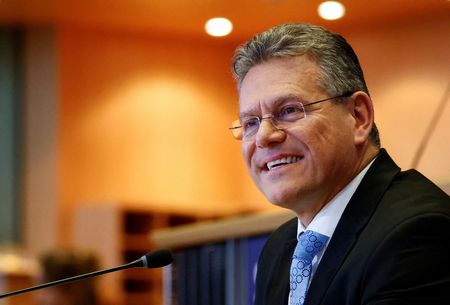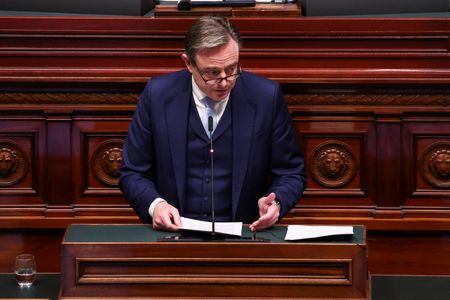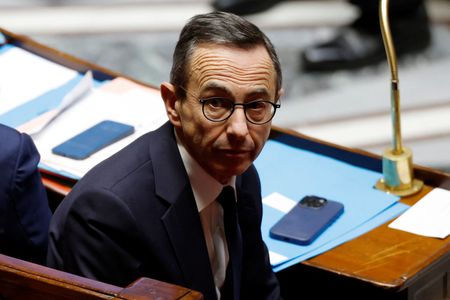By Philip Blenkinsop
WARSAW (Reuters) – The European Union wants to engage swiftly with the United States over President Donald Trump’s planned tariffs, trade chief Maros Sefcovic said on Tuesday, while his boss Ursula von der Leyen stressed the bloc would protect its interests in negotiations.
Sefcovic, speaking before a meeting of EU ministers to debate trade and EU competitiveness, said he wanted “early engagement” and was awaiting confirmation of the appointment of Trump’s pick for Commerce Secretary, financier Howard Lutnick.
“We are ready to engage immediately and we hope that through this early engagement, we can avoid the measures which would bring a lot of disturbance to the most important trade and investment relationship on this planet,” he told reporters.
Von der Leyen, the European Commission president, said the EU executive’s first priority was to work on the many areas where EU and U.S. interests converge, such as critical supply chains and emerging technologies.
In a speech in Brussels, she said the EU was ready for tough negotiations to work out grievances and set the foundations for a stronger partnership.
“We will be open and pragmatic in how to achieve that. But we will make it equally clear that we will always protect our own interests – however and whenever that is needed,” Von der Leyen said.
EU officials say contacts with the Trump administration have been limited so far, noting that Trump’s picks for top jobs are not able to speak to foreign counterparts until their positions have been confirmed. Von der Leyen and Trump have not been in contact since Trump’s inauguration.
The EU meeting in Warsaw started just a few hours after additional U.S. tariffs of 10% on Chinese goods took effect, prompting China to hit back. Canada and Mexico were also in line for 25% U.S. tariffs on Tuesday, but each secured a 30-day pause.
Trump has said the European Union is next in line. He has repeatedly complained about the U.S. trade deficit with the 27-country EU.
Sefcovic said that deficit, including services trade, was around 50 billion euros, or around 3% of overall annual EU-U.S. trade of 1.5 trillion euros, while 4 million jobs on both sides of the Atlantic were reliant on this open trading relationship.
“We believe through constructive engagement and discussion we can resolve this problem,” he said.
Sefcovic did not go into how the bloc might negotiate, but some ministers offered advice on the EU approach.
Luxembourg foreign minister Xavier Bettel, who was prime minister during Trump’s first term, said the EU needed to be united and strong and not begin negotiations with concessions.
“This is not the Marrakech souk,” he said. “We don’t offer. We listen, we exchange, we say things. We don’t offer.”
Irish trade minister Peter Burke also said it was not worthwhile at this point to make offers.
(Reporting by Philip Blenkinsop; additional reporting by Bart Meier, Jan Strupczewski and Lili Bayer in Brussels; Editing by Catherine Evans)








